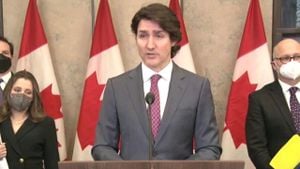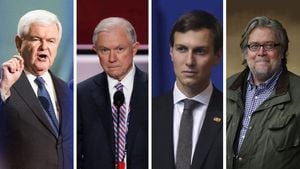Former President Donald Trump finds himself at the center of legal and political intrigue as he prepares to take office for the second time, amid serious criminal convictions. Despite being labeled as a convicted felon due to his recent jury verdict related to hush money payments, Trump’s access to highly classified information remains largely unaffected. This paradox raises important questions about the intersection of legal disqualifications and presidential privileges.
Recently, Trump was found guilty of 34 felonies by a jury stemming from his charge of conspiracy related to hush money payments made during his first presidential campaign. While such felony convictions typically disqualify individuals from holding security clearances, there's more at play here. The former president is not just any individual; he is the president-elect, reviving debates over how access to sensitive information is granted.
New presidents traditionally receive broad access to confidential information, including intelligence briefings informed by the President’s Daily Brief. This secretive document provides insights on national security matters, making its access pivotal for anyone at the helm of the country. Following this tradition, Trump will inherit this privilege starting January 20, 2025, when he begins his new term.
The complexity of Trump’s legal situation cannot be ignored. Alongside his New York conviction, he is also facing multiple criminal charges across various jurisdictions related to attempts to overturn the 2020 election results, including serious allegations of obstruction of justice for retaining sensitive documents unlawfully. Such legal challenges would typically raise substantial concerns about whether someone should hold access to national security information.
Yet, under current U.S. law, the president fundamentally does not require formal security clearance to access classified information. Dakota Rudesill, an associate professor of law and expert on secrecy, notes this legal framework which allows presidents to access sensitive materials simply by virtue of their elected position. Rudesill highlights the fact, stating, “Presidents get access to classified information because of the office they hold, not because they meet criteria outlined in executive orders and administrative rules.”
This means Trump's second term will allow him unfettered access to classified documents—even with his felony status looming. While this may infuriate critics who argue about the severity of his alleged crimes, the legal standing remains firmly on Trump's side due to the unique constitutional position he occupies as president. Rudesill summarizes his thoughts on the matter: “Practically and legally speaking, he is at the apex of the executive branch’s massive secrecy apparatus.”
On the political front, Trump’s ability to obtain security clearance has ramifications beyond his personal situation—it signals to voters and opponents alike how justice and accountability might play out among high-profile figures. Concerns are arising about the potential misuse of the classified information he will have access to. When the American electorate voices its choice by voting for Trump again, they inadvertently endorse the complicated dynamics of law, power, and accountability.
Leading up to his inauguration, Trump's return to office is fraught with controversy, accusations, and varying degrees of public support. Trump continues to rally his base even as legal troubles loom overhead. His legal team is asserting their confidence and arguing vigorously for his presidency, leveraging populist sentiments to stay engaged with his supporters. They maintain the narrative of victimization at the hands of political adversaries, claiming these legal challenges are partisan attacks rather than legitimate inquiries.
This narrative has polarized public perception, with strong factions either defending or criticizing Trump's legacy and expected new term. The debate surrounding Trump's access to highly confidential information serves as just one aspect of the broader national dialogue on justice, governance, and the electoral process.
Analysts and pundits will be watching closely to see how these developments play out once Trump officially takes office again. The legal framework surrounding presidential privileges will face significant scrutiny, as expectations for transparency and accountability continue to traverse through political commentary and public discourse.
Overall, Trump's unique position and the legal ramifications stemming from his actions have the potential to reshape the political arena significantly. His ability to access classified information, juxtaposed with the concerns surrounding his convictions, will not only influence his actions as president but will also critically impact how future leaders may navigate the complex relationships between law, ethics, and politics.



